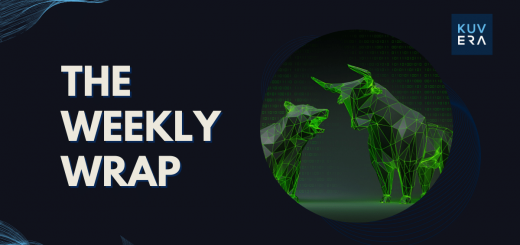In this edition, we talk about the recent stock market rally. We also remember the ‘Big Bull’ Rakesh Jhunjhunwala and take a quick look at the factors that are moving the markets.
Welcome to Kuvera’s weekly digest on the most critical developments related to business, finance and markets.
tl;dr Hear the article in brief instead?

Aanewala pal janewala hai
Ho sake toh is me zindagi bita do
Pal jo yeh janewala hai
Few lyricists and poets in India have matched the level of popularity that Gulzar sahab has attained over the past six decades. So, here’s a belated birthday wish to him and a sincere apology for using a few lines from his song in the classic 1979 comedy Gol Maal to highlight the importance of living in the moment.
And no, we are not saying this only to investors in stocks and mutual funds, as equity markets bounced back over the past few weeks. Instead, this is something each one of us could learn to do better—especially in a world so fragile and a life so uncertain, as the sudden demise of ace investor Rakesh Jhunjhunwala this past week reminds us yet again.
Anyway, let’s get on with the main task at hand.
When India’s stock market crashed in March 2020—much like in the rest of the world—few would have predicted a quick recovery. But recover it did, and how! Within six months, the benchmark indices had regained most of the lost ground. And then they continued to climb, defying the naysayers.
Something similar has happened in 2022, and not once but twice already. Consider this: the BSE Sensex slipped from above 61,000 in January to around 52,260 in March. It came close to 61,000 again in April and then fell below 51,000 in June, dragged down by interest rate hikes as well as concerns related to inflation and an economic slowdown.
And now, barely two months later, the Sensex climbed above 60,000 yet again. The NSE Nifty followed a similar trajectory, and came within kissing distance of 18,000. On Friday, however, both indices fell almost 1.1%.
We will get to the reasons behind the rally and the fall in a little while, but what should investors do at this moment?
Should you take some profits off the table or stay invested? Should you invest even more as some “market experts” predict the bull run will continue? Or should you choose fixed deposits instead now that interest rates are rising?
Well, there is no one right answer for everyone. Each investor should make a decision that’s right for themselves considering a host of factors such as their asset allocation, capital requirements, and risk appetite.
Jhunjhunwala’s legacy
The Big Bull of Dalal Street, Rakesh Jhunjhunwala, passed away last weekend due to ill health. He was 62. His death came as a shock to most people as he was seen in public just days before during the launch of low-cost carrier Akasa Air.
Jhunjhunwala made his mark with a big bet on Titan, the Tata Group’s watches and jewellery arm, about two decades ago. His stock market picks are among the most widely followed portfolios in the country. He held stakes in at least 32 publicly listed companies and his portfolio was worth more than Rs 32,000 crore at the time of his death.
Titan was the biggest stock in his portfolio, accounting for almost a third of the total value. Tractor maker Escorts Kubota, Star Health & Allied Insurance, Metro Brands, Tata Motors, Tata Communications, Indian Hotels and CRISIL were the other stocks in his portfolio.
By far the most well-known stock market investor in India, Jhunjhunwala was always bullish on the India growth story. Also regarded by some as the Warren Buffett of India, Jhunjhunwala not just built a fortune by investing in stocks but also encouraged scores of people to look at stock market investments to create wealth.
Carpe Diem
The stock market’s rebound indeed prompted some investors to seize the moment and take profits. The most notable investors this week to do so were two US-based private equity firms—KKR & Co. and Blackstone Group Inc.
KKR & Co. has sealed its biggest exit deal from India, after retuning its private equity ship in the South Asian nation with a few key moves over the last two years. KKR sold its entire 27.5% stake in Max Healthcare Institute Ltd and pulled out about Rs 9,200 crore. It had previously sold shares of the hospital chain twice, in August 2021 and earlier this year. In all, it generated a total of Rs 15,700 crore from Max Healthcare.
Blackstone, the world’s biggest PE firm by assets, sold part of its stake in auto component maker Sona BLW Precision Forgings Ltd for around Rs 4,045 crore. Last year, at the time of Sona BLW’s IPO, Blackstone had sold shares worth Rs 5,250 crore. This means Blackstone has generated a total of around Rs 9,300 crore from the two share sales. Its remaining stake in Sona is worth about Rs 6,200 crore.

Crude oil, economic outlook
A number of factors in recent weeks helped the market rebound. In India, markets took comfort from continued strong inflows from local investors and the return of foreign portfolio investors after almost 10 months.
A decline in crude oil prices and a slight moderation in inflation helped, too. In fact, the price of India’s crude oil basket declined to a six-month low of $91.45 per barrel this week. This is down from a near 14-year high of $128.24 per barrel after Russia invaded Ukraine on Feb. 24.
Global crude oil prices have fallen in recent weeks due to concerns about a global recession and slowing demand.
The decline in crude oil prices may not immediately result in a similar drop in prices at the retail level. But it does give greater room to the Reserve Bank of India on interest rates and makes its fight against inflation a little easier. The RBI said in its monthly bulletin this week that it expects retail inflation to ease to 5% by April-June 2023.
Moreover, signs of a slowdown in the US economy are prompting some analysts and investors to predict the US Federal Reserve may not increase interest rates as aggressively as they thought earlier.
However, the minutes of the Fed’s July 26-27 policy meeting showed this week that there was “little evidence” of inflation pressures easing in the U.S. The Fed has also said that it remains committed to lifting interest rates as high as necessary to bring inflation under control.
This clouds the outlook of the world’s biggest economy and will have a domino effect on the rest of the world, more so because of the war in Europe and a sharp slowdown in China, the world’s No.2 economy.
Will all this hurt India, too? Probably. How hard? That’s difficult to say.
‘The worst is behind us’
Some analysts are, however, optimistic that the worst period of financial instability for India might be over.
Global financial services firm Morgan Stanley said in a note this week that India’s retail inflation and trade deficit are likely to moderate in coming months, and that prices of commodities, food, oil have fallen from their peaks.
“We believe the worst of macro instability is behind us now, though moderation in inflation and narrowing of India’s trade deficit will be gradual,” said Upasana Chachra, chief India economist at Morgan Stanley.
But take this commentary, like all analyst opinions, with a pinch of salt. After all, as Gulzar sahab reminds us, the moment that’s about to come, is about to pass by as well. That’s the circle—and confusion—of life.

Other headlines:
- Wholesale inflation drops to five-month low of 13.93% in July
- SBI, HDFC Bank, ICICI Bank, Kotak Mahindra Bank, Ujjivan Small Finance Bank raise FD rates
- Fairfax-backed Digit Insurance files for Rs 3,500-crore IPO
- Syrma SGS Technology IPO subscribed 32.61 times
- ONGC Q1 net profit jumps 251% to Rs 15,206 crore, revenue climbs 84%
Until next week, happy investing!
———–
Interested in how we think about the markets?
Read more: Zen And The Art Of Investing
Check out our “Investor Education Originals” on Youtube and get smart about investing.
Start investing through a platform that brings goal planning and investing to your fingertips. Visit kuvera.in to discover Direct Plans and Fixed Deposits and start investing today.
#MutualFundSahiHai #KuveraSabseSahiHai!






